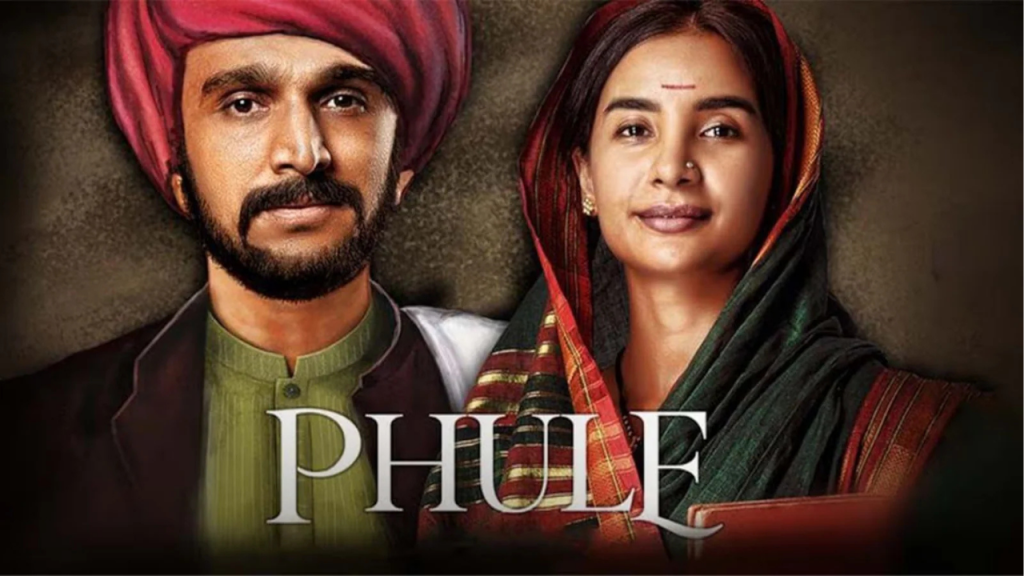Language: Hindi
Age Rating: UA (Suitable for viewers above 13 years)
Genre: Biographical Drama, Historical
Director: Ananth Mahadevan
An Important Story That Needed Telling
With Phule, director Ananth Mahadevan brings to the big screen the untold yet extraordinary story of Jyotirao Phule and Savitribai Phule—two revolutionary figures who laid the foundation for women’s education and caste reform in 19th-century India. The film aspires to offer both a history lesson and a tribute to their legacy. But while the message resonates, the execution doesn’t always do justice to the impact of its protagonists.
Check Out: Phule Trailer Review: A Powerful Tribute to India’s Social Reformers
Plot That Echoes Through Time
Set against the backdrop of colonial-era Pune, the story opens during the devastating bubonic plague of 1897 and quickly transports viewers to the earlier days of Jyotirao and Savitribai’s journey. Through societal rejection, threats, and humiliation, they fought for girls’ education, widow upliftment, and caste equality—defying not only the British rulers but also regressive Indian traditions.
From digging a well to provide water access to the so-called “untouchables” to establishing schools for girls, the Phules emerge as courageous reformers who challenged norms with resilience and grace. The film’s narrative is deeply rooted in their struggles, yet told with a subdued energy that often feels at odds with the fire of its subject matter.
Performances That Carry the Message
Pratik Gandhi’s Thoughtful Portrayal
As Jyotirao Phule, Pratik Gandhi delivers a grounded and emotionally rich performance. He captures the balance of inner conflict and outer calm with precision—his quiet intensity speaking louder than any dramatic outburst. His portrayal is sincere, human, and deeply respectful.
Patralekhaa’s Moments of Power
Patralekhaa plays Savitribai with dignity and determination. While some of her dialogues feel overly rehearsed and less organic, she still manages to shine in crucial scenes, especially when confronting societal hypocrisy. Her monologue on Brahmanical privilege is one of the film’s standout moments.
Supporting Cast
Darsheel Safary, in a minor role as the Phules’ adopted son, feels underutilized, while Alexx O’Nell, Amit Behl, and Joy Sengupta lend credible support, enhancing the narrative’s authenticity.
Direction That Reflects Restraint
Ananth Mahadevan, who previously helmed Mee Sindhutai Sapkal, opts for a restrained, documentary-style approach. While this lends realism, it also results in a pace that feels sluggish at times. The screenplay lacks the emotional highs needed to keep viewers consistently engaged, despite the profound historical subject matter.
The muted color palette and minimalistic background score reinforce the film’s sobering tone but also contribute to a certain visual monotony.
Where the Film Excels
- Authentic Representation: A sincere depiction of caste oppression and social reform.
- Strong Moral Core: It sparks much-needed conversations about equality, education, and women’s rights.
- Non-preachy Tone: Despite being message-heavy, the film avoids being didactic.
Where It Falters
- Sluggish Pacing: The slow burn doesn’t always reward patience.
- Emotional Disconnect: Moments that should be moving often feel flat.
- Underwhelming Score: The music fails to elevate key moments.
Music and Technical Brilliance
Unlike mainstream biopics that rely heavily on melodrama, Phule takes a more subdued route, which at times works to its advantage. The background score, though subtle and flute-driven, rarely amplifies the narrative. The production design and costumes are era-appropriate, and the cinematography reflects the film’s meditative tone. However, the lack of visual dynamism may limit its appeal to wider audiences.
Final Verdict: ⭐️⭐️⭐️½ (3.5/5)
Phule is a commendable attempt to spotlight two of India’s earliest and bravest social reformers. Despite its storytelling flaws, it stands as a necessary reminder of a history that’s too often overlooked. The performances—particularly Pratik Gandhi’s—and the film’s noble intent deserve applause. With a more engaging screenplay, it could have been unforgettable.
Should You Watch It?
Yes, especially if you are interested in Indian history, social reform movements, or biographical dramas. While it may not be a cinematic spectacle, Phule is a story that needs to be heard, remembered, and honored. It’s not perfect, but it is powerful—in its quietest moments.

